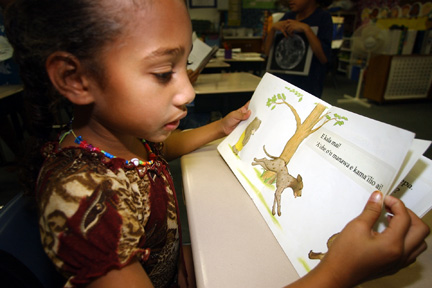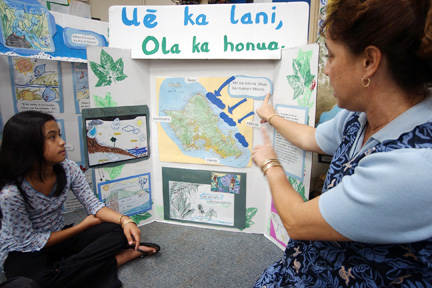
|
Language revival
Hawaiian rates as the nation’s only
growing indigenous tongue
"E heluhelu kakou," Nako'olani Warrington tells her third-graders -- let's read together.
But there's no need to translate at Ke Kula Kaipuni o Anuenue, a public immersion school where all instruction for the 350 students is in the Hawaiian language.
The school represents a turnaround for the native language in the islands, which 20 years ago appeared to be fading away.
A 1983 survey estimated that only 1,500 people remained in Hawaii who could speak it, most of them elderly. Today there are probably 6,000 to 8,000 Hawaiian-language speakers throughout the state, most of them under the age of 30, said Kalena Silva, professor of Hawaiian studies at the University of Hawaii-Hilo.
"Before, people would hear me speaking Hawaiian to someone and ask what language I was speaking," said Leilani Basham, coordinator of the Hawaiian language program at the University of Hawaii's flagship Manoa campus. "I don't get that anymore."
Silva remembers that when he joined the UH-Hilo faculty 20 years ago, only 10 students were majoring in Hawaiian studies and Hawaiian language. Now there are more than 100, he said, including some from the mainland and from Germany and Japan. Hawaiian language enrollment also has increased at UH-Manoa.
Silva, who also is director of UH-Hilo's Ka Haka 'Ula Ke'eliikolani College of Hawaiian Language, attributes the greater interest in learning Hawaiian to community efforts. Those efforts began in the early 1980s with parents and Hawaiian-language instructors who wanted to make sure the language remained strong on Niihau, a privately owned island populated exclusively by native Hawaiians.
As a result, Hawaiian is the only indigenous language in the United States that showed growth in the 2000 census, said Verlieann Leimomi Malina-Wright, vice principal of Anuenue school. About 200,000 of Hawaii's 1.2 million people are of native Hawaiian ancestry.

Maleka Benjamin, 9, listens to teacher Nako'olani Warrington at Ke Kula Kaipuni o Anuenue. Hawaiian speakers in the state probably number more than 6,000 now.
Hilo also has provided curricula and materials for the public school immersion programs, where elementary and secondary students receive all instruction in Hawaiian.
The immersion program began in 1987 with about 16 students at two sites in Honolulu and Hilo.
"We now have 19 sites, not including four public charter immersion schools," said Keoni Inciong, the state Department of Education's specialist for the Hawaiian language immersion program.
Instruction from kindergarten through fourth grade is in Hawaiian, with English introduced in fifth grade, Inciong said. And while some secondary texts are in English, instruction is in Hawaiian, he said.
Most of the students are of Hawaiian ancestry, but it's not a requirement, and the majority come from English-speaking homes, he said.
"When we started in 1987, the main focus was on perpetuating the Hawaiian language," Inciong said. "Now we have the equal goal of a quality education, with emphasis on culture, traditions and values."
Thirty-eight students have graduated from Anuenue school, said Malina-Wright. At least half have gone to college -- including all of last year's class -- and have done well, she said. While some continue with Hawaiian studies, "our first college graduate was an English major who hopes to become a screenwriter," she said.
Silva and Basham hope that understanding of the language will increase.
"Our vision is that eventually Hawaiian become a language of a large bilingual population. We believe that everyone in Hawaii has a responsibility to the native language," said Silva.
Hawaiian is already spoken in the islands in a variety of ways.
Island ceremonies usually include a chant or prayer in Hawaiian, and Hawaiian music with lyrics in the native language are making people more aware. The new Hawaiian music category for the Grammy awards requires the majority of vocal songs that are entered be sung in the Hawaiian language.
The Honolulu Star-Bulletin publishes a weekly Sunday column in Hawaiian. Hawaii Public Radio broadcasts a daily newscast in Hawaiian and a "Hawaiian word of the day" segment.
Most U.S. colleges recognize Hawaiian and allow it to fulfill students' language requirements, Basham said.
State Sen. J. Kalani English, who is of part-Hawaiian ancestry and speaks Hawaiian, also wants the language used more extensively. He introduced a bill that would require state and county governments to print letterheads and documents in both English and Hawaiian, with Hawaiian listed first.
Hawaiian is already recognized, along with English, in the state Constitution as an official state language.
Another bill this session would have required all state and county signs to be in Hawaiian as well as English. That was the idea of Daniel Anthony, a Hawaiian-language student from Honolulu who persuaded his aunt, state Rep. Maile Shimabukuro, to sponsor the measure.
"It would mean a lot to use the language I love every day," said Anthony.
www.olelo.hawaii.edu/dual/orgs/keelikolani
[News] [Business] [Features] [Sports] [Editorial] [Do It Electric!]
[Classified Ads] [Search] [Subscribe] [Info] [Letter to Editor]
[Feedback]
